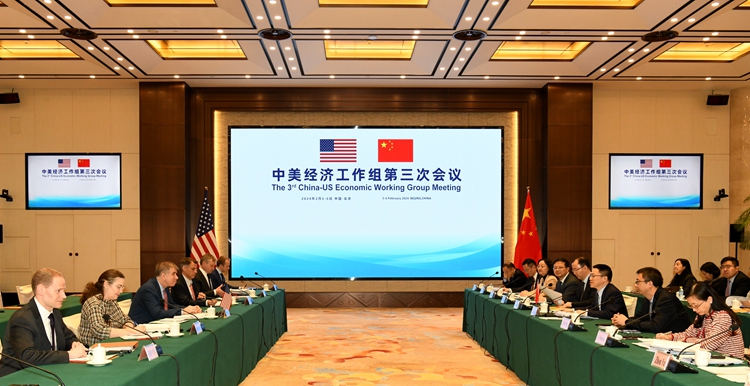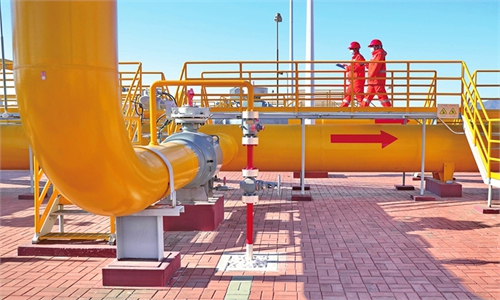
The third China-US Economic Working Group meeting is held from February 5 to 6, 2024 in Beijing. Photo: Ministry of Finance
China and the US have continued to build momentum for interactions in various fields as the third meeting of the economic working group has just concluded its two-day exchanges in Beijing. Analysts noted that compared to the stalemate between China and the US in early 2023 due to the “balloon incident,” it was a good start for the exchanges between the two countries in 2024. The analysts added that the US side needs to make more efforts to safeguard the "fragile stability" of bilateral relations, considering the numerous challenges, particularly the upcoming presidential election.
The China-US economic working group held its third meeting in Beijing from Monday to Tuesday, during which the two sides conducted in-depth, candid, pragmatic and constructive exchanges on topics such as the macroeconomic situation and economic policies of the two countries, the G20 fiscal and financial cooperation, the debt of developing countries and industrial policies, China's Ministry of Finance said in a statement on Tuesday.
The Chinese side also expressed concerns over the US tariff hikes on China, two-way investment restrictions and sanctions to suppress Chinese enterprises. The two sides agreed to continue to maintain communication, according to the release.
The third economic meeting is a concrete implementation of the consensus reached by two heads of state in San Francisco in November, 2023. The intensity of the interaction between China and the US is quite high recently, which is a positive trend, Da Wei, director of the Center for International Security and Strategy at Tsinghua University, told the Global Times on Wednesday.
“This meeting, along with other future talks, will contribute to maintaining the momentum of the bilateral relationship. Especially since 2024 is the US presidential election year, it is necessary to have some substantial and pragmatic contacts to maintain the stability of bilateral relations," Da said.
The two-day meeting is the latest interaction between China and the US at the beginning of 2024, and compared to the stalemate between China and the US in early 2023 due to the “balloon incident,” it was a good start for the exchange between the two countries in various fields in 2024, analysts said.
On the first day of 2024, Chinese President Xi Jinping and US President Joe Biden exchanged congratulations on the 45th anniversary of the establishment of diplomatic relations between the two countries.
Subsequently, from January 8 to 9, the 17th China-US Defense Policy Coordination Talks were held in Washington, DC, US. On January 30, Chinese State Councilor Wang Xiaohong, also director of the China National Narcotic Control Committee, met with a US interagency delegation led by Deputy Assistant to the US President and Deputy Homeland Security Advisor Jen Daskal in Beijing and announced the inauguration of the China-US Counternarcotics Working Group.
Chinese Foreign Minister Wang Yi, also director of the Office of the Central Commission for Foreign Affairs and a member of the Political Bureau of the Communist Party of China (CPC) Central Committee, and US National Security Advisor Jake Sullivan also had meetings lasting more than 12 hours on January 26 and 27 in Bangkok, Thailand, which were characterized as "candid, substantive and fruitful" strategic communication on implementing the consensus reached by the two heads of state at the San Francisco summit.
Lü Xiang, a US studies expert and research fellow at the Chinese Academy of Social Sciences, told the Global Times on Wednesday that the meeting of the China-US economic working group played a positive role in stabilizing bilateral relations, which can be expected to continue in 2024, because the US cannot afford a more severe bilateral relationship.
"Yet we still need to be cautious as to whether China-US relations will have upward momentum," he said.
According to a release from the US Department of the Treasury, during the meeting, US officials expressed “concern” including China’s “overcapacity” and the release also noted that the US reaffirmed that it is not seeking to decouple the two economies and instead seek a healthy economic relationship, with both sides agreeing to meet again in April.
In response to US’ "concern" about China's "overcapacity," Lü said China has full production capacity, and is now the only major country without inflation. "There is huge room for China to adopt proactive fiscal and monetary policies in the future, and the US should get a correct understanding about this issue, which could be another outcome of the meeting," the expert said.
Experts also said the easiest issue for China and the US to solve is trade, which however the Biden administration has limited time to address because of the election. The analysts added that there should be no illusions about a breakthrough in China-US relations in 2024.
Growing challenges
Although the China-US relations have seen a relatively smooth start in 2024, they may still face instability due to factors such as the US presidential election and some unexpected events, analysts noted.
Da said that there are more challenges due to the presidential election in 2024, but it’s not the first time for China to experience such a scenario. “In the past few years, there have been provocative remarks on China from candidates, mainly in terms of rhetoric, but less in policies,” the expert said, noting that the stability depends on whether both sides are willing to manage the relationship.
Da, who is visiting the US, said that the overall perception of China in the US is quite fixed and negative, but China is neither currently the central topic of discussion in the US, nor has it been a major factor in the ongoing US presidential election. The primary concerns in the US are still domestic issues such as immigration and the economy, while its top foreign policy priorities related to Ukraine and the Middle East.
“Currently, both China and the US have the intention and are making efforts to maintain a stable relationship, a ‘fragile stability’ perhaps, but I think it can be expected to continue this year,” Da said.
Election factors weigh more in the Biden administration’s consideration toward the China-US relationship. Biden is currently walking a tightrope as he wants to present a perception domestically that he is putting the US in an advantageous position in the China-US relations. However, he also needs to promote equal and mutually beneficial progress in handling the relationship with China, Li Haidong, a professor at the China Foreign Affairs University, told the Global Times.
Li also sees the US presidential election as the biggest uncertainty for China-US relations in 2024, and he noted that it cannot be ruled out that some unpredictable measures could be taken due to US’ domestic political struggles at the crucial moment of the election, leading to deterioration in bilateral relations.
Some Chinese analysts also warned that the US has never abandoned its two-faced approach on China – seeking engagements with China while strengthening competition and keeping provocation on certain issues, especially the South China Sea issue and the Taiwan question. The recent appointment of seasoned Asia expert Kurt Campbell as the second-ranking official at the State Department by Biden serves as a prime illustration of this approach.
According to the Associated Press report, the US Senate approved Kurt Campbell as deputy secretary of state on Tuesday US local time, which underscores efforts by Biden and his modern predecessors to “turn the US main foreign policy focus to China as the big challenge for America going forward.”
Experts noted that the appointment of Campbell indicates that US’ implementation of the so-called Indo-Pacific strategy will be strengthened, with the aim of competing with and containing China.
Li noted that Biden considers the China-US relationship within the context of US domestic politics, which means US’ defining the relationship as competition with China is unlikely to change.





